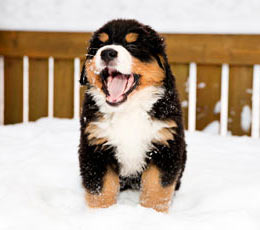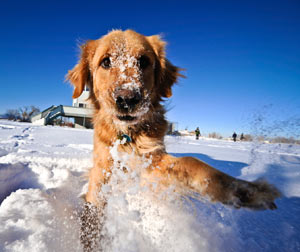Cold Weather Tips for Dogs

Winter can be a grueling time for people. It's cold, it can be hard to get around, and slipping and falling risks are increased. It's easy to think that dogs are impervious to the detrimental effects of cold weather because most of them have fur. The truth is that our canine friends can suffer from some of the same uncomfortable or dangerous cold weather conditions that we can. Here are some cold weather consequences for dogs and the associated tips to help you increase your pet's enjoyment of the season.
Ingesting Toxic Substances
There are many food and non-food substances that can be toxic when eaten by dogs. It's important to be diligent all year about what your dog has access to that might harm her if she eats it. In the winter-time, there are a few extra substances around to be aware of.
-
Rock Salt: Salt is commonly used as a de-icer on roads and sidewalks in cold climates. Some dogs are drawn to licking it up. Dogs also ingest salt when they walk through it, then lick their feet, bellies, and legs to clean it off. Eating small amounts of de-icing products can cause vomiting and diarrhea. Eating larger amounts can cause your dog to develop an electrolyte imbalance and this can lead to increased thirst, kidney damage, seizures and death. Salt products are also very irritating to dogs' paw pads and skin. Your dog's feet and pads can become cracked, bleed, and even get infected if she walks on too much salt.
- Make a habit of wiping down your dog's belly, feet, and legs when she comes inside during the winter. Doing this will remove the de-icer before it can irritate the skin or be ingested by your pet.
- Consider a pair of doggie booties
for your dog to wear outside during the winter. These will prevent salt from collecting on her feet. Many dogs tolerate them very well. Booties have the bonus benefits of keeping your dog's feet warmer and preventing ice from building up in the hair between the toes.
-
Antifreeze: There is more antifreeze around during the winter and it is extremely hazardous to dogs. One tablespoon can kill a 10-pound dog. Unfortunately, dogs can actually be drawn to licking up spilled antifreeze; the sweet taste attracts them.
- Clean up any antifreeze spills immediately and well (Clean up as much as you can, soak the rest up with kitty litter, and use large amounts of water to rinse the area).
- Store unused antifreeze where it can't be knocked over and licked by your dog.
- Don't allow your dog to roam the neighborhood by herself. Walk her only on a leash in order to prevent her from finding someone else's antifreeze spill.
- There are antifreeze products that are labelled as "pet friendly" or "safer for pets." These products contain an additive that causes the antifreeze to taste bitter rather than sweet. It is important to understand that these products are still not safe for pets to ingest. The hope is that animals will be more unlikely to be drawn to the more bitter taste but you should still be diligent about cleaning any spills.

Irritation of Arthritis
Dogs with arthritis can experience more pain associated with their joints when the weather is cold. Here are some tips on how to keep your arthritic dog more comfortable during the winter.
- Keep your dog moving. It's easy to be more sedentary in the winter months but that can be detrimental to sore joints. Continue to walk your arthritic dog daily to keep the joints from becoming stiff and more painful. Be sure to walk on surfaces that aren't slippery. Dog booties can also help your dog keep good traction.
- Watch your dog's weight. If your dog is moving less during the winter, it may be necessary to decrease her calories a bit. Becoming overweight puts extra strain on already-sore joints—and this aggravates arthritis.
- Consider medications or supplements. There are medications and supplements that can help keep your arthritic dog comfortable. Talk with your veterinarian to determine whether this would be beneficial for your dog or, if she already takes such medications, whether a dose change during the winter may be helpful. Do not change your dog's medication dose or give any over-the-counter medications or supplements without asking your veterinarian first.
Frostbite
Dogs can get frostbite and it usually occurs on the toes, ears, and tail. If it is cold enough outside to be concerned about frostbite for yourself, be concerned about your dog as well. Limit your dog's time outdoors during frigid temperatures. A pair of doggie booties and a sweater can help but don't rely on them alone. If your dog has been outside during extremely cold temperatures, examine her skin for any areas that look pale. If you find any, contact your veterinarian immediately for help.
Becoming Lost
Dogs that are outdoors by themselves may have a harder time finding their way back home during the winter. The normal smells and sights of the neighborhood are disguised by snow and frozen ground. Be extra diligent about keeping your dog on a leash or within your fenced yard when the weather is cold.
Dangerous Conditions Inside Vehicles
We are reminded often throughout the warm months not to leave our dogs alone inside of a parked car. It may not be as obvious that this is a dangerous practice in cold weather also. Being left inside of a cold car for long periods is like being left outdoors. Your dog will be trapped in very cold conditions, risking frostbite and hypothermia.
A Note on Outdoor Dogs
It is best if your dog does not stay outdoors during the winter. It can be extremely dangerous at worst and uncomfortable and boring at best. If you are completely unable to bring your dog inside, consider a heated garage, shed, basement, laundry room, or any heated shelter. If it is absolutely necessary to keep your dog outdoors, pay close attention to the following requirements.
- An outdoor dog MUST have shelter during the winter. Your dog's shelter must be well-insulated and should be big enough for her to stand up, turn around, and curl up. The shelter must also have a wind-block to keep frigid air from blowing in on her.
- You MUST keep fresh water available for your outdoor dog at all times. You need to check the water bowl often to ensure that it hasn't frozen, tipped over, filled with snow, or gotten dirty. Fresh, unfrozen water is essential to your dog's health.
- An outdoor dog will require increased calories during the winter. Give your dog more food so that she can keep her body conditioning up and be better able to stay warm.
- Booties and sweaters may help your outdoor dog stay warmer but you need to change them often so they don't become wet from snow.
- Dogs CAN get hypothermia and freeze to death outdoors during frigid temperatures. This is more common in younger and older dogs but, in certain conditions, can happen to any dog.
With some attention to your dog's extra needs during cold weather, you can both better enjoy the season and count down to warmer days.
You May Also Like These Articles:
How to Get Dog Urine out of Carpet
Animal Cruelty: Signs and Prevention of Cruelty to Dogs
Walking Your Dog to Help with Weight Loss
Disclaimer: This website is not intended to replace professional consultation, diagnosis, or treatment by a licensed veterinarian. If you require any veterinary related advice, contact your veterinarian promptly. Information at DogHealth.com is exclusively of a general reference nature. Do not disregard veterinary advice or delay treatment as a result of accessing information at this site. Just Answer is an external service not affiliated with DogHealth.com.
Notice: Ask-a-Vet is an affiliated service for those who wish to speak with a veterinary professional about their pet's specific condition. Initially, a bot will ask questions to determine the general nature of your concern. Then, you will be transferred to a human. There is a charge for the service if you choose to connect to a veterinarian. Ask-a-Vet is not manned by the staff or owners of DogHealth.com, and the advice given should not delay or replace a visit to your veterinarian.


